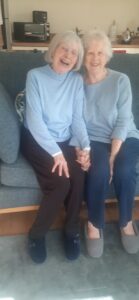 Has someone told you recently that you look good for your age? It’s like being handed a rose with thorns. While the intention of such comments may be good, they’re actually loaded with the implicit bias that being younger is better and that the recipient’s best years are behind him or her. An American commentator said, ‘If someone says, “You look good for your age” I’ll say, ‘What does that mean?’ and then they’ll say, “You look good…” And then it breaks down, and the person is left really questioning, ‘What did I just say?’”
Has someone told you recently that you look good for your age? It’s like being handed a rose with thorns. While the intention of such comments may be good, they’re actually loaded with the implicit bias that being younger is better and that the recipient’s best years are behind him or her. An American commentator said, ‘If someone says, “You look good for your age” I’ll say, ‘What does that mean?’ and then they’ll say, “You look good…” And then it breaks down, and the person is left really questioning, ‘What did I just say?’”
Another remark is, ‘I hope I look as good as you when I’m your age.’ It comes from a view that says, ‘old is bad, young is good.’ In other words, it’s ageist thinking. And research shows that if you harbour these negative thoughts, as you grow older yourself they become self- directed and lead to physical illnesses and even an earlier death.
It also reveals that the person is out of touch with what’s really happening with old age today. Last week we heard about the 95 year old who graduated from Kingston University with an MA in Modern European Philosophy. Retired psychiatrist David Marjot completed his latest studies 72 years after he originally qualified as a doctor. And now he’s thinking about a part-time doctorate, which could take him until he is 102 to complete. Scrolling down the link-page shows a few other older graduates – and there are many more than that.
A few days ago, I met 96 year old Audrey: a neighbour of my (almost 90-year-old) friend Ruth. Audrey lives alone and looks after herself in a ground floor apartment. ‘There’s nothing wrong with her!’ Ruth told me, and Audrey agreed. No high blood pressure, no arthritis, no dodgy knees, or hips, only a degree of deafness in one ear, and she needs to wear spectacles. And ‘my teeth are not as good as they used to be,’ she said, ‘they’re getting a bit crumbly.’
Audrey was married for 37 years, and has lived 27 years as a widow after her husband died. ‘He was the best husband in the world,’ she said. She made a major life change four years ago, moving from her bungalow in Nailsea to Monmouth in Wales to be near her son. It was a huge wrench and at first she felt lost and lonely, missing her old friends. She has made new ones in Monmouth, and she loves being near her grandchildren, especially Harry, who is so much like his grandad.

Every day she talks to her 98 year old sister who lives in Pennsylvania. They chat for about an hour, using their iPads. Audrey has booked a trip over for a few weeks, and would love Ruth to go with her, especially as Ruth has friends in Pennsylvania, but Ruth is caring for her husband who is living with dementia. We talk about flying British Airways from terminal five at Heathrow. ‘It’s a very long walk and you need to go up and down escalators and take a little train at one point,’ I said. She will ask her son to telephone and request airline assistance. Earlier in the week she had walked a mile and a half down the road and through the single high street to Waitrose and back again, using her rollator. ‘But the pavements in Monmouth are dreadful,’ she commented, ‘probably because it’s a very old town.’
She puts her good health and old age down to always keeping active and having good friends to talk to. She’s been a keen gardener and has always walked a lot. Also, she says she is a talker, adding, ‘come and visit me at any time!’
Audrey’s photograph doesn’t really do her justice; she looks about 65. But I definitely don’t tell her she looks good for her age – just that she really does look good!
Ageist thoughts are hidden in our subconscious and we’re not aware that we have them. Take the Quiz at The Age Without Limits Website, and surprise yourself!














